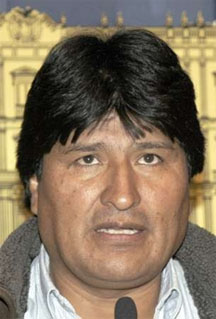OROMOMO, Bolivia, (Reuters) – Bolivia’s leftist government opened a consultation process yesterday with indigenous people to decide the fate of a proposed highway that has drawn sharp criticism on environmental grounds.
The government will take until mid-September to consult 69 communities in the Isiboro Secure Indigenous Territory and National Park (TIPNIS), where work on the middle section of the 185-mile(300 km) road has been halted for nearly a year.
Fierce opposition to the $420 million highway has put President Evo Morales at odds with his indigenous support base. The road is at the heart of the president’s drive to boost infrastructure investment in the impoverished nation.
“The state will respect the decisions and opinions of the inhabitants of TIPNIS,” Minister of Water and the Environment Felipe Quispe said.

“They will decide the future of their territory, which has been declared intangible,” he said, speaking in the village of Oromomo, about 250 miles(400 km) northeast of La Paz, Bolivia’s capital.
In April, Morales rescinded the contract that had been awarded to Brazil’s OAS to build the road. BNDES, Brazil’s state development bank, was due to fund about 80 percent of the troubled project.
Some local authorities said they would take advantage of the consultation process to ask for improved services and development from the national government during consultation.
But long-standing opponents were frustrated by the opening of consultation and want the project canceled instead.
“The government wants to present us as enemies of democracy, but what we really want to show is that this is a rigged consultation, a trap made in favor of a road that will destroy our park,” said Fernando Vargas, who opposes the road. He helped lead a 370-mile (600 km) march against the road that ended in June.









